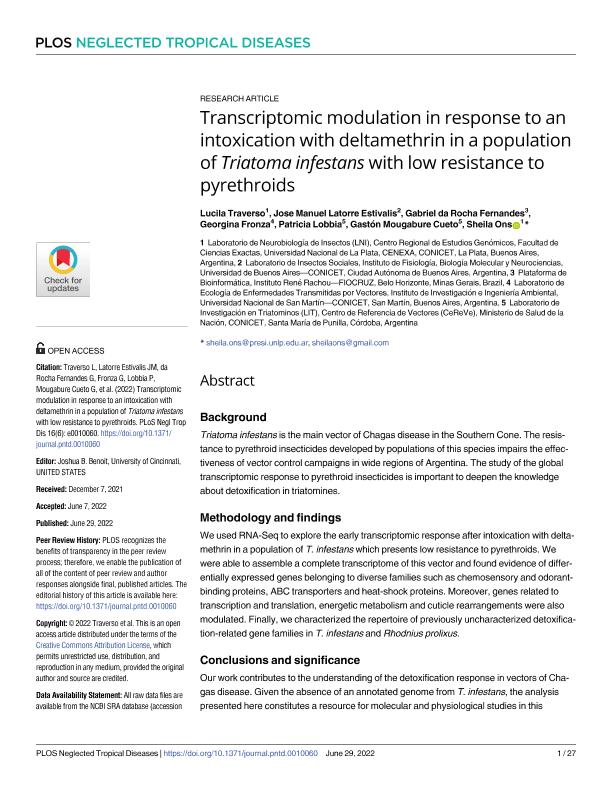Mostrar el registro sencillo del ítem
dc.contributor.author
Traverso, Lucila María

dc.contributor.author
Latorre Estivalis, Jose Manuel

dc.contributor.author
Rocha Fernandes, Gabriel da
dc.contributor.author
Fronza, Georgina

dc.contributor.author
Lobbia, Patricia Alejandra

dc.contributor.author
Mougabure Cueto, Gastón Adolfo

dc.contributor.author
Ons, Sheila

dc.date.available
2023-03-02T14:28:31Z
dc.date.issued
2022-06
dc.identifier.citation
Traverso, Lucila María; Latorre Estivalis, Jose Manuel; Rocha Fernandes, Gabriel da; Fronza, Georgina; Lobbia, Patricia Alejandra; et al.; Transcriptomic modulation in response to an intoxication with deltamethrin in a population of Triatoma infestans with low resistance to pyrethroids; Public Library of Science; Neglected Tropical Diseases; 16; 6; 6-2022; 1-27
dc.identifier.issn
1935-2735
dc.identifier.uri
http://hdl.handle.net/11336/189397
dc.description.abstract
Background Triatoma infestans is the main vector of Chagas disease in the Southern Cone. The resistance to pyrethroid insecticides developed by populations of this species impairs the effectiveness of vector control campaigns in wide regions of Argentina. The study of the global transcriptomic response to pyrethroid insecticides is important to deepen the knowledge about detoxification in triatomines. Methodology and findings We used RNA-Seq to explore the early transcriptomic response after intoxication with deltamethrin in a population of T. infestans which presents low resistance to pyrethroids. We were able to assemble a complete transcriptome of this vector and found evidence of differentially expressed genes belonging to diverse families such as chemosensory and odorantbinding proteins, ABC transporters and heat-shock proteins. Moreover, genes related to transcription and translation, energetic metabolism and cuticle rearrangements were also modulated. Finally, we characterized the repertoire of previously uncharacterized detoxification-related gene families in T. infestans and Rhodnius prolixus. Conclusions and significance Our work contributes to the understanding of the detoxification response in vectors of Chagas disease. Given the absence of an annotated genome from T. infestans, the analysis presented here constitutes a resource for molecular and physiological studies in this species. The results increase the knowledge on detoxification processes in vectors of Chagas disease, and provide relevant information to explore undescribed potential insecticide resistance mechanisms in populations of these insects.
dc.format
application/pdf
dc.language.iso
eng
dc.publisher
Public Library of Science

dc.rights
info:eu-repo/semantics/openAccess
dc.rights.uri
https://creativecommons.org/licenses/by/2.5/ar/
dc.subject
TRIATOMA INFESTANS
dc.subject
INSECTICIDE
dc.subject
TRANSCRIPTOMICS
dc.subject.classification
Bioquímica y Biología Molecular

dc.subject.classification
Ciencias Biológicas

dc.subject.classification
CIENCIAS NATURALES Y EXACTAS

dc.title
Transcriptomic modulation in response to an intoxication with deltamethrin in a population of Triatoma infestans with low resistance to pyrethroids
dc.type
info:eu-repo/semantics/article
dc.type
info:ar-repo/semantics/artículo
dc.type
info:eu-repo/semantics/publishedVersion
dc.date.updated
2023-02-09T15:16:37Z
dc.journal.volume
16
dc.journal.number
6
dc.journal.pagination
1-27
dc.journal.pais
Estados Unidos

dc.description.fil
Fil: Traverso, Lucila María. Consejo Nacional de Investigaciones Científicas y Técnicas; Argentina. (conicet - Unlp). Grupo Vinculado Laboratorio de Neurobiologia de Insectos (g.v. Al Cenexa); Argentina
dc.description.fil
Fil: Latorre Estivalis, Jose Manuel. Consejo Nacional de Investigaciones Científicas y Técnicas; Argentina. Universidad de Buenos Aires. Facultad de Ciencias Exactas y Naturales. Departamento de Biodiversidad y Biología Experimental. Laboratorio del Grupo de Estudio de Insectos Sociales; Argentina
dc.description.fil
Fil: Rocha Fernandes, Gabriel da. Instituto René Rachou; Brasil
dc.description.fil
Fil: Fronza, Georgina. Consejo Nacional de Investigaciones Científicas y Técnicas; Argentina. Universidad Nacional de San Martín. Instituto de Investigaciones e Ingeniería Ambiental. Laboratorio de Ecología de Enfermedades Transmitidas por Vectores; Argentina
dc.description.fil
Fil: Lobbia, Patricia Alejandra. Consejo Nacional de Investigaciones Científicas y Técnicas; Argentina. Ministerio de Salud. Dirección de Enfermedades Transmisibles por Vectores. Centro de Referencia de Vectores; Argentina
dc.description.fil
Fil: Mougabure Cueto, Gastón Adolfo. Consejo Nacional de Investigaciones Científicas y Técnicas; Argentina. Ministerio de Salud. Dirección de Enfermedades Transmisibles por Vectores. Centro de Referencia de Vectores; Argentina
dc.description.fil
Fil: Ons, Sheila. Consejo Nacional de Investigaciones Científicas y Técnicas; Argentina. (conicet - Unlp). Grupo Vinculado Laboratorio de Neurobiologia de Insectos (g.v. Al Cenexa); Argentina
dc.journal.title
Neglected Tropical Diseases

dc.relation.alternativeid
info:eu-repo/semantics/altIdentifier/url/https://journals.plos.org/plosntds/article?id=10.1371/journal.pntd.0010060
dc.relation.alternativeid
info:eu-repo/semantics/altIdentifier/doi/https://doi.org/10.1371/journal.pntd.0010060
Archivos asociados
